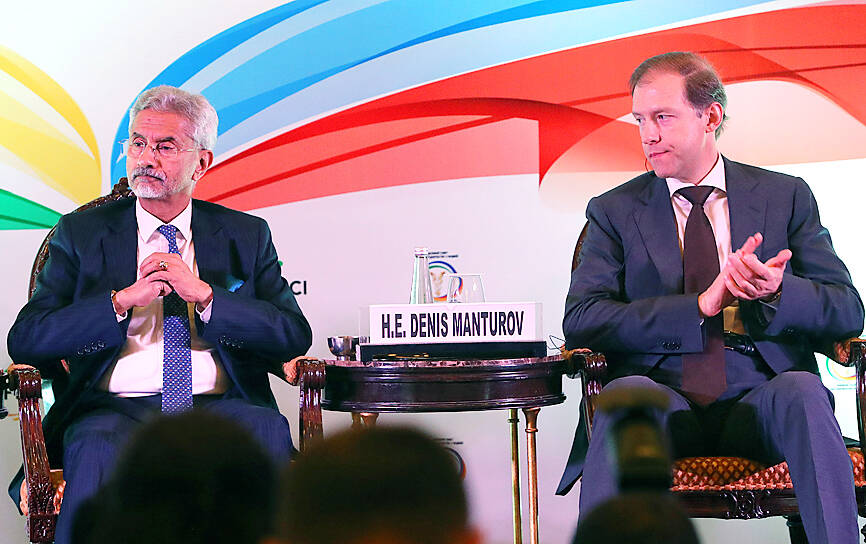India and Russia are discussing a free trade agreement, ministers said yesterday, a move that would further deepen bilateral commercial ties that have flourished since Moscow’s invasion of Ukraine.
Indian Minister of External Affairs Subrahmanyam Jaishankar told an event in New Delhi that his government was in “advance agreement” on a trade treaty that Russian Minister of Trade and Industry Denis Manturov said would bring a guarantee of bilateral investment.
India has not explicitly criticized Russia’s invasion of Ukraine — which Moscow describes as a “special military operation” — and has called for a peaceful resolution of the conflict through dialogue.

Photo: EPA-EFE
Russia, a traditional defense equipment supplier, also displaced Iraq last month to become India’s top supplier of crude oil. Overall Indian imports from Russia increased almost fourfold to US$46.33 billion in the year to March 31.
Moscow was looking to increase machinery imports from India to improve the trade balance, Manturov said.
“We need to find a niche in the products which India can replace,” he told reporters on the sidelines of the event. “In civilian projects, we need as wide cooperation as it was before the sanctions.”
Reuters reported in November last year that Russia was potentially seeking to import more than 500 products from India for key sectors including automobiles, aircraft and trains, as Western sanctions undermine Moscow’s ability to keep core industries operating.
India also aims to narrow its growing trade deficit with Russia, which has been India’s largest supplier of military equipment for decades and is the fourth-biggest market for Indian pharmaceuticals.
Jaishankar said that Indian business could benefit from Russian technology and that New Delhi was working to iron out payments, certification and logistics issues.

On Ireland’s blustery western seaboard, researchers are gleefully flying giant kites — not for fun, but in the hope of generating renewable electricity and sparking a “revolution” in wind energy. “We use a kite to capture the wind and a generator at the bottom of it that captures the power,” said Padraic Doherty of Kitepower, the Dutch firm behind the venture. At its test site in operation since September 2023 near the small town of Bangor Erris, the team transports the vast 60-square-meter kite from a hangar across the lunar-like bogland to a generator. The kite is then attached by a

Foxconn Technology Co (鴻準精密), a metal casing supplier owned by Hon Hai Precision Industry Co (鴻海精密), yesterday announced plans to invest US$1 billion in the US over the next decade as part of its business transformation strategy. The Apple Inc supplier said in a statement that its board approved the investment on Thursday, as part of a transformation strategy focused on precision mold development, smart manufacturing, robotics and advanced automation. The strategy would have a strong emphasis on artificial intelligence (AI), the company added. The company said it aims to build a flexible, intelligent production ecosystem to boost competitiveness and sustainability. Foxconn

Leading Taiwanese bicycle brands Giant Manufacturing Co (巨大機械) and Merida Industry Co (美利達工業) on Sunday said that they have adopted measures to mitigate the impact of the tariff policies of US President Donald Trump’s administration. The US announced at the beginning of this month that it would impose a 20 percent tariff on imported goods made in Taiwan, effective on Thursday last week. The tariff would be added to other pre-existing most-favored-nation duties and industry-specific trade remedy levy, which would bring the overall tariff on Taiwan-made bicycles to between 25.5 percent and 31 percent. However, Giant did not seem too perturbed by the

TARIFF CONCERNS: Semiconductor suppliers are tempering expectations for the traditionally strong third quarter, citing US tariff uncertainty and a stronger NT dollar Several Taiwanese semiconductor suppliers are taking a cautious view of the third quarter — typically a peak season for the industry — citing uncertainty over US tariffs and the stronger New Taiwan dollar. Smartphone chip designer MediaTek Inc (聯發科技) said that customers accelerated orders in the first half of the year to avoid potential tariffs threatened by US President Donald Trump’s administration. As a result, it anticipates weaker-than-usual peak-season demand in the third quarter. The US tariff plan, announced on April 2, initially proposed a 32 percent duty on Taiwanese goods. Its implementation was postponed by 90 days to July 9, then